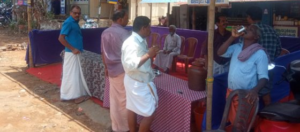
By Fahad Marzook T U, Hazard Analyst (Meteorology), Kerala State Emergency Operations Center (KSEOC),
Kerala State Disaster Management Authority (KSDMA), Kerala, India

Kerala, with its well-known monsoon season and moderate temperatures, is facing a new challenge – extreme heat. This rise in temperatures is not just uncomfortable; it’s a serious threat to people, wildlife, and the environment. Kerala, however, is demonstrating a proactive approach to combating heatwaves. The Kerala State Disaster Management Authority (KSDMA) is at the forefront of this fight. Recognizing the urgency, KSDMA has declared heatwaves, sunstroke, and sunburn as state-specific disasters. This allows access to disaster relief funds (SDRF & SDMF) for crucial relief and mitigation efforts. KSDMA also launched awareness programs to educate the public and established a UV index monitoring network to track harmful ultraviolet radiation.
Kerala’s Heat Action Plan (HAP) is a comprehensive strategy for tackling heatwaves. It uses scientific analysis to address heat-related challenges, with a particular focus on protecting vulnerable communities. The plan includes measures to reduce disaster risks, allocates finances for mitigation initiatives, and promotes sustainable cooling solutions. To address local needs, Local Heat Action Plans (LHAPs) are being developed in collaboration with local governments. The revised HAP goes beyond immediate physical dangers. It incorporates considerations for mental health during extreme heat events, explores architectural interventions for heat mitigation in buildings, and addresses potential human-animal conflicts that might arise due to changing weather patterns. Importantly, the plan emphasizes collaboration across various sectors – from water management and energy efficiency to ensuring inclusivity in heat resilience strategies.
A pioneering initiative under KSDMA, Heat Resilient LSGs, focuses on building resilience at the local level. LSG stands for Local Self Government, the building blocks of Kerala’s administration. This initiative promotes sectoral interventions, strengthens the capacity of local bodies to respond to heatwaves, and aims to create replicable models for other regions. Moodadi, a coastal panchayat in Kozhikode has been selected as the living lab of KSDMA for the Heat Resilient LSGs program. Along with Sectoral interventions guidelines for construction practices ensure heat resilience in infrastructure, including the creation of Heat Resilient Anganwadi centres.
To address immediate health concerns, Kerala is establishing heat clinics in major hospitals. Additionally, the health department will ensure primary health centres are equipped to handle heat-related emergencies. During the scorching summer of 2023, Thanneer Pandals – cooling centres offering water, fruits, and oral rehydration solutions – were a huge success. Local communities played a vital role in setting these up. The Kerala water authority collaborates with KSDMA to identify areas facing water scarcity during hot summers and establish water kiosks in those locations. Local governments are responsible for maintaining these kiosks, with financial support from KSDMA.
Kerala’s commitment to combating heat extends beyond the HAP. The State Action Plan on Climate Change (SAPCC) provides a broader framework for comprehensive climate adaptation and mitigation strategies. KSDMA collaborates with the Kerala Institute of Local Administration (Kila) to focus on climate change downscaling for LSGs, ensuring local governments have the information they need to prepare. Additionally, partnerships with institutions like the Woodwell Climate Research Centre and Geohazards International helps create localized data on heat projections using advanced climate models (CMIP6). This data is crucial for effective planning and decision-making in the face of climate change-induced extreme heat events. Furthermore, Kerala collaborates with UNICEF, GeoHazards Society, WRI India, and various universities & institutes to share knowledge and develop effective heat mitigation strategies.
Kerala’s battle against extreme heat is a testament to its unwavering commitment to public well-being. From recognizing heatwaves as disasters to pioneering initiatives like Thanneer Pandals and the Heat Resilient LSGs project, KSDMA has consistently demonstrated proactive leadership. The state’s emphasis on collaboration with NGOs, communities, and academic institutions fosters collective ownership of heat mitigation strategies, ensuring effective implementation and adaptation.
Disclaimer: The views expressed in this piece are those of the author/s and do not necessarily reflect the views or policies of AIDMI.